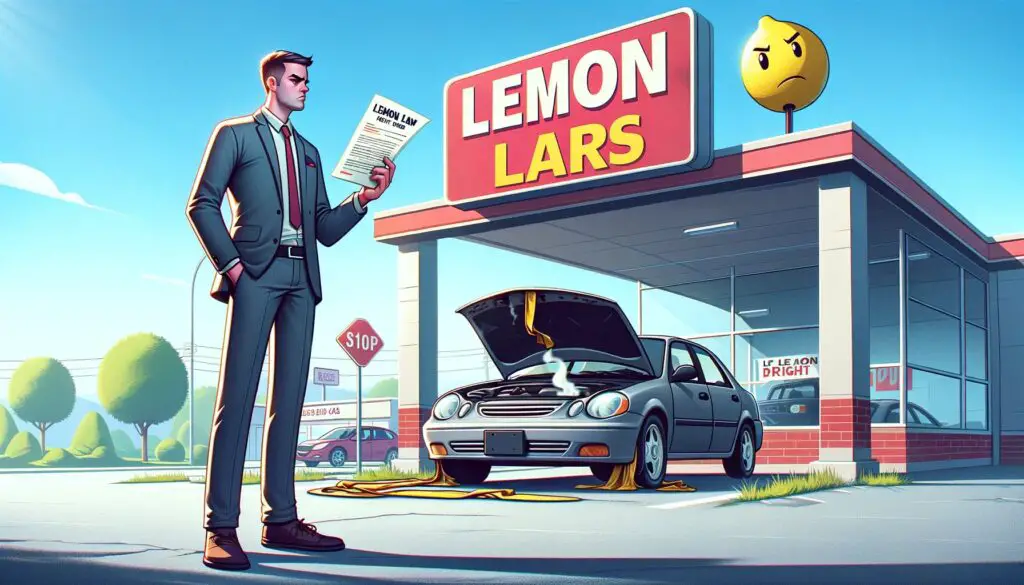In the realm of used car purchases, the initial excitement of acquiring a new set of wheels can quickly turn into a distressing experience when unforeseen issues arise with the vehicle. This article delves into the steps and strategies you should undertake when facing such a situation. We understand that when it comes to providing valuable information to consumers, the depth and accuracy of the content are paramount.
Introduction: Navigating the Unpleasant Surprise
Purchasing a used car should be a thrilling endeavor, but it can swiftly sour when problems emerge unexpectedly. In this guide, we’ll navigate the labyrinthine landscape of resolving issues with a bad used car purchase and help you regain control of the situation.
Buying a used car offers the allure of affordability and flexibility, but it also comes with inherent risks. Despite diligent research and scrutiny, unforeseen issues can surface, turning what should be a joyous acquisition into a frustrating ordeal. From mechanical malfunctions to undisclosed damages, encountering problems with a used car can feel like stumbling into a maze of confusion and uncertainty.
However, fear not. With the right knowledge and approach, you can navigate through these challenges effectively. Whether you’re grappling with a lemon, grappling with a lemon, unfamiliar with lemon laws, or facing resistance from uncooperative sellers or dealerships, this guide is designed to equip you with the tools and insights needed to steer through the storm and emerge on the other side with a satisfactory resolution.
So, buckle up and prepare to reclaim control of your used car buying experience. Together, we’ll unravel the complexities, address common concerns, and chart a course towards a positive outcome. Let’s embark on this journey of empowerment and reclaim the joy of owning a reliable and rewarding vehicle.
Knowing Your Rights: Empowerment through Information
Understanding your rights as a consumer is crucial when dealing with a problematic used car purchase. When purchasing a used vehicle, it’s essential to differentiate between “as-is” and “warranty” sales.
- As-Is Sales: In an “as-is” sale, the dealership or seller offers the vehicle without any guarantees or promises regarding its condition. Essentially, the buyer takes on all risks associated with potential defects or issues that may arise after the purchase. In other words, once the transaction is completed, the buyer assumes full responsibility for any repairs or problems that emerge.
- Warranty Sales: Conversely, a sale with a warranty involves the dealership or seller providing specific assurances regarding the vehicle’s condition. A warranty typically outlines the scope of coverage and the duration during which the seller will address certain issues or provide remedies. This could include repairs, replacements, or refunds within the terms specified by the warranty agreement. It’s essential to carefully review the terms of the warranty to understand what is covered and for how long.
Understanding the distinction between these types of sales is critical because it determines the recourse available to you if problems arise after the purchase. If you buy a car “as-is” and later encounter issues, you may have limited options for recourse, as you assumed the risk of any potential defects. However, if the sale included a warranty, you may be entitled to certain protections and remedies outlined in the warranty agreement.
Moreover, consumer protection laws may also provide additional rights and safeguards, regardless of the sales agreement. These laws often include provisions such as implied warranties of merchantability and fitness for a particular purpose, which apply to all sales transactions, including those involving used cars.
By understanding your rights and the terms of your purchase agreement, you can make informed decisions and take appropriate action if problems arise. Whether negotiating repairs, seeking refunds, or exploring legal options, knowledge empowers you to advocate for a fair resolution to your used car concerns. If you’re unsure about your rights or need assistance, consider consulting legal experts or consumer advocacy organizations for guidance.
Unraveling the Situation: Evaluating the Car’s Problems
Assessing the severity of the issues affecting your purchased car is crucial in determining the appropriate course of action. Documenting these problems thoroughly through photographs, videos, and detailed written descriptions lays a solid foundation for presenting your case effectively.
- Documenting the Issues: Start by thoroughly inspecting the vehicle and identifying all visible problems, including mechanical issues, cosmetic defects, or any other concerns. Take clear and detailed photographs from multiple angles to capture the extent of the damage or malfunction. Additionally, recording videos can provide valuable visual evidence of any abnormal sounds, movements, or malfunctions observed while operating the vehicle.
- Written Descriptions: Supplement your visual documentation with written descriptions detailing each problem encountered. Include relevant information such as when the issue first occurred, its frequency or persistence, and any attempts made to address it. Be concise yet thorough in your descriptions, providing enough detail to convey the nature and severity of each problem effectively.
- Keep Records: Maintain a comprehensive record of all communications and interactions related to the vehicle’s problems. This includes correspondence with the dealership, seller, or manufacturer, as well as records of any repairs or maintenance performed on the car. Keeping organized documentation strengthens your case and facilitates communication with relevant parties.
- Seek Professional Evaluation: If necessary, consider obtaining a professional evaluation or inspection of the vehicle by a qualified mechanic or automotive expert. Their expert assessment can provide valuable insights into the root causes of the problems and help bolster your case with independent verification.
- Understand Your Rights: Familiarize yourself with your rights as a consumer, particularly regarding warranty coverage, lemon laws, and any applicable consumer protection regulations. Understanding the legal framework surrounding your purchase empowers you to advocate for your rights effectively and pursue appropriate remedies.
By meticulously documenting the issues plaguing your purchased car and understanding your rights as a consumer, you lay the groundwork for navigating the situation with confidence. Armed with compelling evidence and a clear understanding of your entitlements, you can pursue the most suitable path forward to address the problems and seek a satisfactory resolution.
Your Rights and Recourse: Navigating Legal Avenues
Immediate Action: Notifying the Dealership and Beyond
Seeking Legal Expertise: The Power of Professional Consultation
Aiming for Resolution: Negotiating with the Dealership
Effective negotiation with the dealership can lead to repairs or even a refund. We’ll highlight the role of communication in this process and provide insights into escalating the matter to higher management if necessary.
Leveraging Warranties: Making the Most of Your Protection
Utilizing warranties can provide much-needed relief. We’ll guide you through comprehending the terms and coverage of warranties, along with proper procedures for warranty claims and managing covered repairs.
Escalating Disputes: Filing a Complaint and Exploring Mediation
When communication falters, contacting relevant consumer protection agencies becomes crucial. We’ll explain how to file a complaint effectively and delve into the possibilities of mediation and arbitration, offering alternative paths to resolution.
The Courtroom Path: Navigating Legal Waters
For complex cases, filing a lawsuit might be necessary. We’ll outline the steps involved, necessary documentation, fees, and provide insights into presenting a compelling case during the trial.
Calculating Compensation: Understanding Damages
When seeking compensation for issues related to a used car purchase, accurately evaluating your losses is essential. In this section, we’ll explore the different types of compensation available, factors influencing the awarded amount, and potential financial repercussions.
- Types of Compensation:
- Repair Costs: Compensation for repair costs incurred to address mechanical or cosmetic issues with the purchased vehicle.
- Diminished Value: Compensation for the decrease in the vehicle’s value due to prior damage or undisclosed defects, even after repairs are made.
- Loss of Use: Compensation for the inconvenience or loss of use of the vehicle during repair periods or while resolving issues.
- Legal Fees and Expenses: Compensation for any legal fees, expert witness fees, or other expenses incurred in pursuing compensation or resolving disputes.
- Factors Influencing Compensation:
- Severity of Issues: The extent and severity of the problems with the purchased vehicle will directly impact the amount of compensation sought. Major mechanical failures or safety concerns may warrant higher compensation.
- Documentation: The quality and completeness of documentation, including repair estimates, invoices, and evidence of communication with the dealership or seller, can influence the credibility of your claim and the amount of compensation awarded.
- Market Value: The market value of the vehicle both before and after the issues arose will be considered in assessing compensation, particularly in cases involving diminished value claims.
- Legal Precedents: Previous court decisions and legal precedents in similar cases may serve as guidelines for determining appropriate compensation amounts.
- Negotiation Skills: The ability to negotiate effectively with the dealership, seller, or insurance company may influence the final compensation amount obtained.
- Potential Financial Repercussions:
- Out-of-Pocket Expenses: Failure to secure adequate compensation may result in out-of-pocket expenses for repairs, legal fees, and other related costs.
- Diminished Resale Value: If the vehicle’s issues significantly impact its resale value, you may incur financial losses when selling or trading in the vehicle in the future.
- Legal Costs: Pursuing compensation through legal channels can involve expenses such as attorney fees, court costs, and expert witness fees, which may need to be considered when assessing the financial implications.
In conclusion, accurately evaluating your losses and seeking appropriate compensation is essential when addressing issues related to a used car purchase. By understanding the types of compensation available, the factors influencing compensation amounts, and the potential financial repercussions involved, you can effectively advocate for your rights and pursue a fair resolution to your concerns.
Addressing Fraudulent Sales: Dealing with Title Issues
Negotiating a Way Out: Selling Back to the Dealership
Considering a trade-in or buyback arrangement can be a viable solution. We’ll discuss the intricacies involved, potential challenges, and how to ensure a transparent transaction.
Learning from Experience: Growing Through Challenges
Reflecting on the ordeal offers valuable lessons. Sharing your experience can not only assist others but also contribute to a smarter used car buying process in the future.
FAQs: Clearing Common Concerns
Addressing frequently asked questions provides clarity on returning faulty cars, understanding lemon laws, seeking replacements, dealing with uncooperative dealerships, and more.
- Can I return a faulty car? Yes, you have rights under consumer protection laws to return a faulty car. However, specific conditions and timelines may vary depending on your location and the terms of the purchase agreement. It’s advisable to review the warranty and contact the dealership or manufacturer promptly if you encounter any issues.
- What are lemon laws? Lemon laws are statutes designed to protect consumers who purchase defective vehicles, often referred to as “lemons.” These laws vary by state or region but generally provide guidelines and procedures for consumers to seek remedies such as a refund, replacement, or compensation if their vehicle repeatedly fails to meet quality and performance standards despite repair attempts.
- How can I seek a replacement for a faulty vehicle? If your car repeatedly experiences significant defects covered under warranty and repair attempts have been unsuccessful, you may be eligible for a replacement vehicle under lemon laws or the manufacturer’s policies. Document all issues and repair attempts thoroughly, and consult with legal or consumer protection experts for guidance on initiating the replacement process.
- What should I do if a dealership is uncooperative? If you’re experiencing challenges with a dealership regarding a faulty car or warranty issues, escalate your concerns to higher management levels within the dealership or contact the manufacturer’s customer service department directly. If necessary, seek legal advice to understand your rights and options for resolving disputes effectively.
- Are there specific steps to follow when returning a faulty vehicle? While procedures may vary, it’s generally recommended to notify the dealership or manufacturer in writing about the defects and your intention to return the vehicle. Keep records of all communications, repair attempts, and relevant documents such as purchase agreements and warranties. Follow any instructions provided by the dealership or manufacturer regarding the return process.
- What if the warranty has expired? If your vehicle experiences defects after the warranty period has expired, you may still have recourse under consumer protection laws or extended warranty coverage, if applicable. Consult with legal or automotive experts to explore your options for seeking remedies or resolving disputes with the dealership or manufacturer.
Conclusion: Empowered Consumers
To conclude, our comprehensive guide equips you with the tools to navigate the maze of a bad used car purchase. Armed with this knowledge, you can confidently stand up for your rights, seek resolutions, and move forward as an empowered consumer
Recommended Reading:





